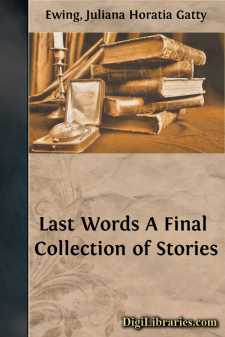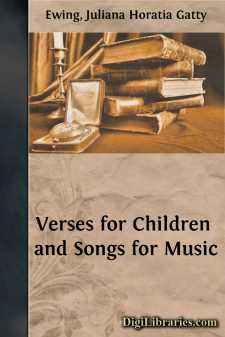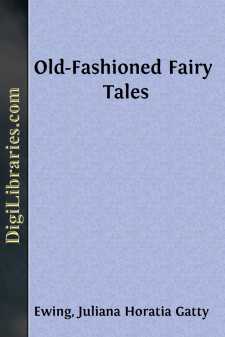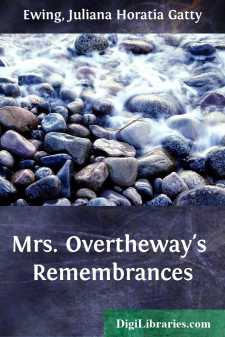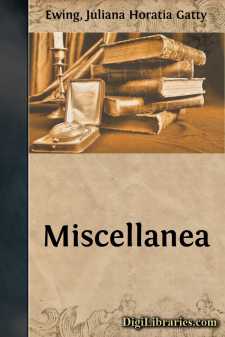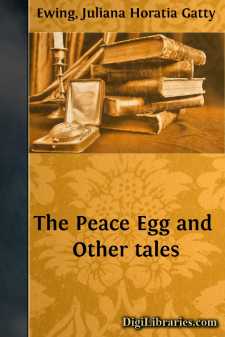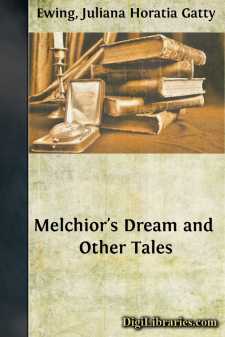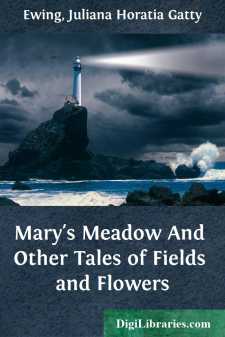Categories
- Antiques & Collectibles 13
- Architecture 36
- Art 48
- Bibles 22
- Biography & Autobiography 813
- Body, Mind & Spirit 142
- Business & Economics 28
- Children's Books 14
- Children's Fiction 11
- Computers 4
- Cooking 94
- Crafts & Hobbies 4
- Drama 346
- Education 46
- Family & Relationships 57
- Fiction 11829
- Games 19
- Gardening 17
- Health & Fitness 34
- History 1377
- House & Home 1
- Humor 147
- Juvenile Fiction 1873
- Juvenile Nonfiction 202
- Language Arts & Disciplines 88
- Law 16
- Literary Collections 686
- Literary Criticism 179
- Mathematics 13
- Medical 41
- Music 40
- Nature 179
- Non-Classifiable 1768
- Performing Arts 7
- Periodicals 1453
- Philosophy 64
- Photography 2
- Poetry 896
- Political Science 203
- Psychology 42
- Reference 154
- Religion 513
- Science 126
- Self-Help 84
- Social Science 81
- Sports & Recreation 34
- Study Aids 3
- Technology & Engineering 59
- Transportation 23
- Travel 463
- True Crime 29
Juliana Horatia Gatty Ewing
Juliana Horatia Gatty Ewing (1841-1885) was an English writer renowned for her children's stories, which often contained elements of fantasy and moral lessons. Her works, including "Jackanapes" and "The Story of a Short Life," are celebrated for their vivid storytelling and deep empathy for young readers. Ewing's literary contributions have left a lasting impact on children's literature, influencing subsequent generations of writers.
Author's Books:
Sort by:
MARY'S MEADOW. CHAPTER I. Mother is always trying to make us love our neighbors as ourselves. She does so despise us for greediness, or grudging, or snatching, or not sharing what we have got, or taking the best and leaving the rest, or helping ourselves first, or pushing forward, or praising Number One, or being Dogs in the Manger, or anything selfish. And we cannot bear her to despise us! We...
more...
THE BURIAL OF THE LINNET.Found in the garden—dead in his beauty.Ah! that a linnet should die in the spring!Bury him, comrades, in pitiful duty,Muffle the dinner-bell, solemnly ring.Bury him kindly—up in the corner;Bird, beast, and gold-fish are sepulchred there;Bid the black kitten march as chief mourner,Waving her tail like a plume in the air.Bury him nobly—next to the donkey;Fetch the old...
more...
There was once upon a time a child who had Good Luck for his godfather. "I am not Fortune," said Good Luck to the parents; "I have no gifts to bestow, but whenever he needs help I will be at hand." "Nothing could be better," said the old couple. They were delighted. But what pleases the father often fails to satisfy the son: moreover, every man thinks that he deserves just a...
more...
IDA.... "Thou shall not lackThe flower that's like thy face, pale Primrose." Cymbeline. The little old lady lived over the way, through a green gate that shut with a click, and up three white steps. Every morning at eight o'clock the church bell chimed for Morning Prayer—chim! chime! chim! chime!—and every morning at eight o'clock the little old lady came down the white...
more...
CHAPTER I. A MEMORABLE NEW YEAR'S DAY. Dorothy to Eleanor, Dearest Eleanor, You have so often reminded me how rapidly the most startling facts pass from the memory of man, and I have so often thereupon promised to write down a full account of that mysterious affair in which I was providentially called upon to play so prominent a part, that it is with shame I reflect that the warning has been...
more...
THE PEACE EGG. A CHRISTMAS TALE. Every one ought to be happy at Christmas. But there are many things which ought to be, and yet are not; and people are sometimes sad even in the Christmas holidays. The Captain and his wife were sad, though it was Christmas Eve. Sad, though they were in the prime of life, blessed with good health, devoted to each other and to their children, with competent means, a...
more...
AN ALLEGORY."Thou that hast given so much to me,Give one thing more—a grateful heart."George Herbert. "Well, father, I don't believe the Browns are a bit better off than we are; and yet when I spent the day with young Brown, we cooked all sorts of messes in the afternoon; and he wasted twice as much rum and brandy and lemons in his trash, as I should want to make good punch of. He...
more...
PREFACE. "Mary's Meadow" first appeared in the numbers of Aunt Judy's Magazine from November 1883 to March 1884. It was the last serial story which Mrs. Ewing wrote, and I believe the subject of it arose from the fact that in 1883, after having spent several years in moving from place to place, she went to live at Villa Ponente, Taunton, where she had a settled home with a garden, and...
more...
t was certainly an aggravated offence. It is generally understood in families that "boys will be boys," but there is a limit to the forbearance implied in the extenuating axiom. Master Sam was condemned to the back nursery for the rest of the day. He always had had the knack of breaking his own toys,—he not unfrequently broke other people's; but accidents will happen, and his twin sister...
more...
INTRODUCTION. Eleanor and I are subject to fads. Indeed, it is a family failing. (By the family I mean our household, for Eleanor and I are not, even distantly, related.) Life would be comparatively dull, up away here on the moors, without them. Our fads and the boys’ fads are sometimes the same, but oftener distinct. Our present one we would not so much as tell them of on any account; because they...
more...


